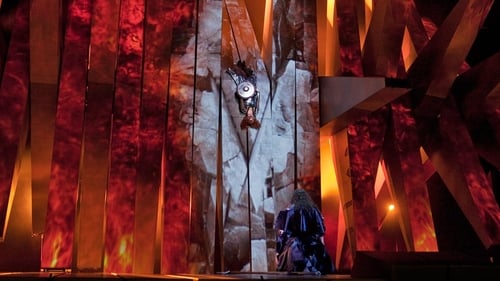
Ortlinde
Soprano Christine Goerke plays Brünnhilde, Wotan’s willful warrior daughter, who loses her immortality in opera’s most famous act of filial defiance. In this Live in HD transmission of Die Walküre, the second and most popular installment in the composer’s sweeping tetralogy, Goerke is joined by bass-baritone Greer Grimsley as Brünnhilde godly father, Wotan, and mezzo-soprano Jamie Barton as his unbending wife, Fricka. As the incestuous lovers Siegmund and Sieglinde, soprano Eva-Maria Westbroek and tenor Stuart Skelton—alongside bass Günther Groissböck as Sieglinde’s bloodthirsty husband, Hunding—round out the principal cast. And on the podium, Maestro Philippe Jordan conducts Robert Lepage’s innovative staging, which uses state-of-the-art stage technology to tell Wagner’s mythic tale.

Ortlinde
As a storm rages, Siegmund the Wälsung, exhausted from pursuit by enemies in the forest, stumbles into an unfamiliar house for shelter. Sieglinde finds the stranger lying by the hearth, and the two feel an immediate attraction. But they are soon interrupted by Sieglinde's husband, Hunding, who asks the stranger who he is. Calling himself "Woeful," Siegmund tells of a disaster-filled life ("Friedmund darf ich nicht heissen"), only to learn that Hunding is a kinsman of his foes. Hunding, before retiring, tells his guest to defend himself in the morning. Left alone, Siegmund calls on his father, Wälse, for the sword he once promised him. Sieglinde reappears, having given Hunding a sleeping potion.

Freia
In the depths of the Rhine, the three Rhinemaidens guard the Rhinegold, a treasure of immeasurable value. The Nibelung dwarf Alberich is dazzled by the sight of it. The girls explain that whoever wins the gold and forges it into a ring will gain power over the world, but must first renounce love. Frustrated by his unsuccessful attempts to catch one of the girls, Alberich curses love and steals the gold. Wotan, lord of the gods, is reproached by his wife Fricka: he has promised to give Freia, goddess of youth, to the giants Fasolt and Fafner in return for their building a fortress for the gods. When the giants demand their reward, Loge, the god of fire, suggests an alternative payment: the ring Alberich has forged from the Rhinegold, and his other treasures. The giants agree, and Wotan and Loge leave for the Nibelungs’ underground home.

Gutrune
The last of the four music dramas in Richard Wagner's Der Ring des Nibelungen. On the rock of Brünnhilde the three Norns weave fate. Valhalla must burn, bringing an end to the gods. Siegfried acquires Brünnhilde’s strength as a Valkyrie. He gives her his ring, and she gives him Grane, her horse. Hagen urges his half-brother Gunther to marry Brünnhilde, although she is fated to be the wife of Siegfried, who is tricked into marrying their sister, Gutrune. Brünnhilde curses Siegfried and tells Hagen he can be wounded only from the back. Hagen pierces Siegfried’s back and mortally wounds him. Siegfried's body is brought back, to Gutrune's distress. Gunther and Hagen fight and the former is killed, but the ring cannot be taken from Siegfried's body. Brünnhilde orders a pyre to be raised and rides into it on Grane, wearing the ring, which will return, on her death, to the Rhinemaidens, who drag Hagen down to the depths of the river. Valhalla finally burns.

Gutrune
Ring Cycle, pt 4. Siegfried is drugged and tricked into kidnapping his wife, since she has the Ring now. More double-crossings, Siegfried ends up dead. Brunnhilde has had enough of this, tosses the Ring into the river and torches the place.

First Lady
Tamino, a handsome prince, and Papageno, a bird-catcher, are sent by the Queen of Night to rescue her daughter Pamina from captivity under the high priest Sarastro. Julie Taymor's abridged, English-language production of the classic Mozart opera.




